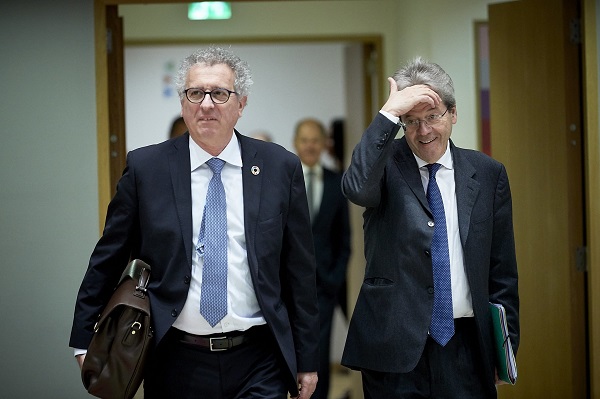 L-R: Pierre Gramegna, Luxembourg's Minister of Finance; Paolo Gentiloni, European Commissioner for the Economy;
Credit: European Council
L-R: Pierre Gramegna, Luxembourg's Minister of Finance; Paolo Gentiloni, European Commissioner for the Economy;
Credit: European Council
On Monday 17 and Tuesday 18 February 2020, Luxembourg's Minister of Finance, Pierre Gramegna, participated in meetings of the Eurogroup and the Ecofin Council in Brussels.
The subject of the review of the European Union's (EU) economic governance framework took centre stage during the two days of meetings and discussions on the subject showed that the simplification and modernisation of the Stability and Growth Pact is an absolute priority which will require the necessary time and energy over the next few months.
On this occasion, Pierre Gramegna called for a budgetary policy for European Union (EU) member states consistent with the EU's objective of climate neutrality. Luxembourg's Finance Minister stated: “The Stability and Growth Pact has succeeded in strengthening the financial stability of the euro area and the European Union. It is a precious asset that should not be squandered or questioned. At the same time, investments should be encouraged to achieve the ambitious goal of climate neutrality by 2050 and prepare the EU for the digital age. To achieve this, the Pact does not need a revolution, but an evolution which can bring the Commission’s Green Deal plan into harmony with the path of more sustained and sustainable growth". He added: "At the same time, we must avoid that sustainable investments in favour of the climate become pretexts for a relaxation of existing rules. Like the success of the EU's adoption of rules for sustainable finance avoiding greenwashing, care must be taken to encourage investment in favour of the climate without calling into question the foundations of the Pact. The path between these two objectives is certainly narrow, but it does exist, and the analysis presented by the Commission recently outlines their profile".
During the Eurogroup meeting of the 27 EU member states, the finance ministers continued work on setting up the budgetary instrument for convergence and competitiveness (BICC) dedicated to the eurozone. Discussions focussed in particular on the question of the financing of this new instrument, beyond the funds which will be allocated to it through the Multiannual Financial Framework (MFF) 2021-2027. The EU finance ministers also discussed the tax burden on labour and the challenges related to a shift to greener taxation.
On the sidelines of the Eurogroup and Ecofin Council meetings, Pierre Gramegna had the opportunity to meet Luxembourg's EU Commissioner Nicolas Schmit during a working lunch for an exchange of views on the priorities of the new European Commission.








